Grant Shapps: ‘I’ve always thought of myself as a Brit whose religion is Jewish’
The Conservative minister tells Jewish News he and his wife's decision to take a Ukrainian family escaping Putin's war into their UK home was 'inspired' by the fact their own families were once 'chased out' by pogroms in Eastern Europe
Lee Harpin is the Jewish News's political editor
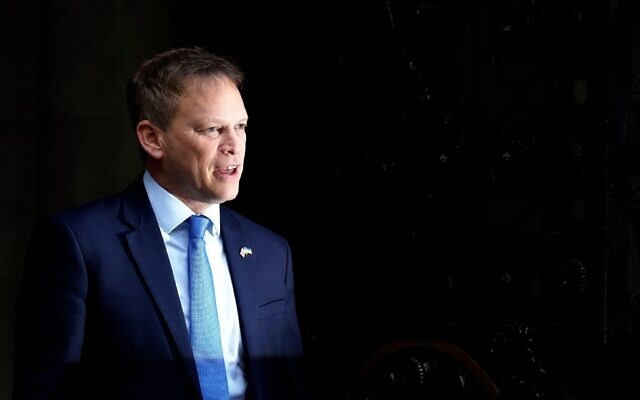
Conservative minister Grant Shapps has told how the decision he and his wife took to move a family from Ukraine into their home to escape Russia’s brutal war was inspired by a recognition that both of their own families once also had to flee pogroms in eastern Europe.
The secretary of state for energy security, and his wife Belinda, who are both Jewish, invited a grandmother, her mother, and her seven year-old son from Kyiv, along with their dog, into their home almost one year ago now after responding to the government’s own homes for Ukraine scheme.
“Yes, it was inspired by the fact that our families were chased out by pogroms three generations ago in eastern Europe,” Shapps revealed to Jewish News. “There is that connection.”
In a revealing interview, the 54 year-old politician, who has held senior roles both within his party, and in cabinet for over 13 years, also spoke of how he now considers his time in the Jewish youth movement BBYO “massively influenced” his career path in Westminster.
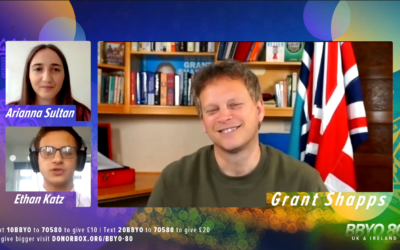
As president of the Pinner branch of BBYO, in north west London, a then 15 year-old Shapps would find himself involved with leadership training courses in Manchester, and even on an international course in Pennsylvania.
“It was the first time I was involved in chairing committees, understanding that process, how hidden agendas work, all sorts of leadership training through that period that most people wouldn’t get until they were in work,” he recalled.
Shapps also confirmed he would always remain a staunch supporter of the state of Israel, while not always being impressed by the government of the day there.
He insisted:”The point I would really make is that I think there’s always a big difference between supporting a nation and supporting a government.
“You know, there are times when Brits won’t support the government in this country but they still feel Britain is a good product, a great country. I feel the same about Israel.”
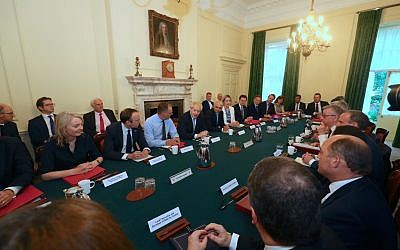
First elected as the MP for Welwyn Hatfield in 2005, Shapps first ministerial role came five years later, when David Cameron was prime minister, when he was made minister for housing and local government, and succession of top roles have followed ever since, including a six day stint as crisis ridden ex-pm LIz Truss’s final home secretary.
Despite his successful career path, Shapps, also a former co-chair of the Tory party, comes across as remarkably down-to-earth and without bravado during our interview.
Perhaps this is something to do with his background, which might be a familiar one to some Jewish News readers.
The son of Beryl and Tony, he describes growing up in a “more traditional, than practicing” Jewish household in Croxley Green, Watford.
“We belong to the orthodox United Synagogue anyway,” he adds. “But I didn’t grow up in a particularly Jewish part of the world at that time.
“I was born in Croxley Green then we moved to Moor Park. But it wasn’t like we were surrounded by other Jewish families. I went to Watford Grammar School. So I wasn’t in Golders Green or Edgware or somewhere.
“It wasn’t like that at all. But as a family, our identity was always as a traditional Jewish family in as much as we are loosely observant, you know… Friday night dinners, shul a couple of times a year.”
Shapps, who took a business course at Manchester Metropolitan University, would later marry his wife Belinda, a practicing psychotherapist, who hails from the Prestwich community on the outskirts of the same city he studied in.
They now have three children.
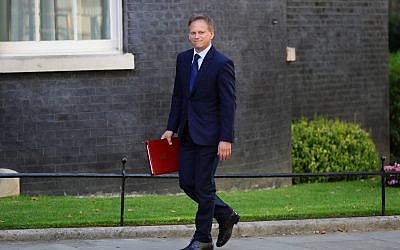
It was during a walk with his wife, after Vladimir Putin’s troops had invaded Ukraine last year, when she had suggested to her husband that they should consider bringing over a family from Ukraine into their home, in an act of great kindness.
Shapps recalled how the government’s Homes for Ukraine scheme had offered up the opportunity to help people fleeing conflict in their own country in a way that hadn’t been possible during earlier conflicts in regions like Syria and Yemen.
“We were on this walk and my wife said to me, that if this scheme gets going I’d really like to take a family,” he recalls of the discussions last year.
“I had mentioned that to my Ukrainian opposite number Oleksandr Kubrakov, who had written a Facebook post about it.
“I sat down with my daughter and we came up with a list of potential families. A week later we ended up with these three, and their dog. They are a lovely family.”
Asked if the decision to allow the family into their home, where they remain today, was inspired by a Jewish sense of wanting to help, Shapps responds:”Yeah, it was.”
With the dog deciding to bark as he continued to speak, the MP adds it was “a little bit inspired by the fact that our families were chased out by pogroms. I mean three generations ago in eastern Europe. So there is that connection.”
He reveals the fact that his eldest son, who was studying in Nottingham, has recently moved out, and his daughter, who is at Leeds “comes and goes” from the family home, leaving only their youngest son permanently in Hertfordshire, has helped free up some extra living space.
It also helped that the family from Kyiv, had a familiarity with kosher food, even though they were Christian themselves.
“We had spoken to them before they came here on Whatsapp video, and we said we were a Jewish family,” Shapps said. “They asked us ‘do you keep kosher?’, and we responded that we did.
“The mother then told us that her husband was from Odessa and had lots of Jewish friends. So they were aware they were not going to be able to eat pork, it wasn’t a problem.
“We buy kosher meat at home. It’s a traditional thing.”
Shapps admits:”I’ll eat non-kosher meat when I am out. You know, we don’t mix milk and meat at home. But I’ll still have a lasagna with cheese on it when I’m out. I’m sure this will be very
familiar to many of your readers.”
We discuss the debt Shapps also feels he owed his days in BBYO.
He came to the movement quite late, as a 14 year-old, but says he instantly loved the fact that here “an organisation run for youth by youth.. there were no adults there.”
He continues:”I remember thinking ‘wow this is a really interesting format. We are running this thing for ourselves, and I quickly got involved'”.
More recently, Shapps recalls reliving his BBYO days with another former member of the youth group in the current cabinet, the current culture secretary Lucy Frazer.
“For the first time in history there are two BBYO-nics in the cabinet!” he says, laughing.
“Lucy and I literally stood in the reception at Downing Street after cabinet the other week. We both said ‘little did we know that two of us would make it to No.10.”
While BBYO back then was connected to the United Synagogue, Shapps recalls the group remained a decidedly “non Zionist” project at this point, with the funding for trips to Israel coming after he had moved on in his life.
It was as a student, “with mates” that Shapps would first come to visit Israel, and he has subsequently gone to the Jewish state either with family, or with government, since.
Within politics, Shapps says that being a member of the Conservative Party has left him feeling “really comfortable” because “we are always the ones that recognise that for all Israel’s faults, and goodness knows there are many, there is only one (Jewish state) in the Middle East.”

Last August, in his most recent visit to Israel while transport minister, Shapps had announced the signing of a memorandum of understanding (MOU) on behalf of the UK with the Jewish State which would see the nations share expertise on large-scale rail projects through the Department for Transport’s Crossrail International advisory company.
The UK-Israel MOU came as Israel undertakes a multi-billion-pound mass transit project in Tel Aviv – the country’s largest and most complicated infrastructure project to ever exist.
Last month, he confirms, he was pleased to be informed that the UK had successfully won the contract.
“Crossrail International, the organisation that built the Elizabeth Line, are now selling their expertise around the world,” he says. “And that Israeli contract’s been a huge success.
“We’ve actually won the work, so the MOU has turned into a contract. It’s actually one of the last things I did as a transport secretary. I had a message from Paul Dyson who leads Crossrail International just the other week to say he wanted to let me know there had been fantastic news and that the MOU had led to this contract.
“It was a trade trip that really brought dividends, which is fantastic.”
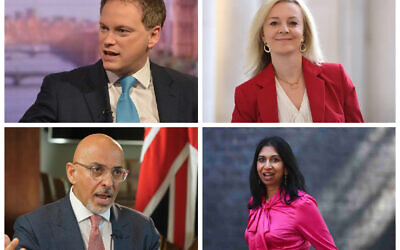
Throughout the interview, it becomes clear how at ease Shapps is with his identity, as a Jew, as a British citizen, and as a member of the Conservative Party.
He also says he has been fortunate enough not to have experienced antisemitism during his political career.
“You know, I’ve always thought of myself as a Brit whose religion is Jewish,” he says at one point.
“I am incredibly comfortable as a British citizen. I think this country just gives opportunities.
“As I said the other week, I was picking an award for Rishi (Sunak) the other week. It was an award for South Asians who break through the glass ceiling. Obviously, to become prime minister is a pretty big deal.
“I had this lovely line, which somebody else actually wrote, that I delivered in my speech.
“It was saying that only in this country would you have a Jewish cabinet minister picking up an award for an Indian Hindu who has become prime minister, in a capital run by a Muslim mayor, in a predominantly Christian country.”
He then reflects on the moment he first became an MP himself in 2005. “I was absolutely by no means the first Jewish MP,” he says. “There were seven Jewish cabinet ministers in the Thatcher government so the glass ceiling had been built.
“That was a long time ago, but there’s nothing particularly remarkable about being a Jewish MP. Bit like that answer on Rishi, the beauty of this country is that it just doesn’t matter.”

Thank you for helping to make Jewish News the leading source of news and opinion for the UK Jewish community. Today we're asking for your invaluable help to continue putting our community first in everything we do.
For as little as £5 a month you can help sustain the vital work we do in celebrating and standing up for Jewish life in Britain.
Jewish News holds our community together and keeps us connected. Like a synagogue, it’s where people turn to feel part of something bigger. It also proudly shows the rest of Britain the vibrancy and rich culture of modern Jewish life.
You can make a quick and easy one-off or monthly contribution of £5, £10, £20 or any other sum you’re comfortable with.
100% of your donation will help us continue celebrating our community, in all its dynamic diversity...
Engaging
Being a community platform means so much more than producing a newspaper and website. One of our proudest roles is media partnering with our invaluable charities to amplify the outstanding work they do to help us all.
Celebrating
There’s no shortage of oys in the world but Jewish News takes every opportunity to celebrate the joys too, through projects like Night of Heroes, 40 Under 40 and other compelling countdowns that make the community kvell with pride.
Pioneering
In the first collaboration between media outlets from different faiths, Jewish News worked with British Muslim TV and Church Times to produce a list of young activists leading the way on interfaith understanding.
Campaigning
Royal Mail issued a stamp honouring Holocaust hero Sir Nicholas Winton after a Jewish News campaign attracted more than 100,000 backers. Jewish Newsalso produces special editions of the paper highlighting pressing issues including mental health and Holocaust remembrance.
Easy access
In an age when news is readily accessible, Jewish News provides high-quality content free online and offline, removing any financial barriers to connecting people.
Voice of our community to wider society
The Jewish News team regularly appears on TV, radio and on the pages of the national press to comment on stories about the Jewish community. Easy access to the paper on the streets of London also means Jewish News provides an invaluable window into the community for the country at large.
We hope you agree all this is worth preserving.





















